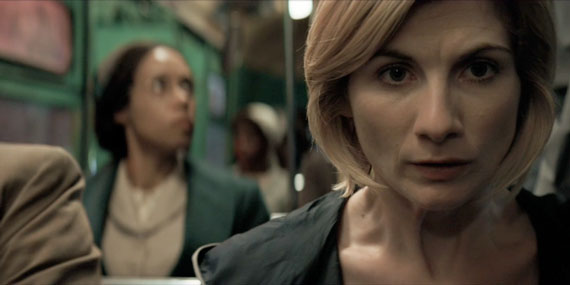13 Reasons Why “Rosa” May Be One of the Most Important Episodes of Doctor Who Ever!

Educational
Doctor Who is at its best whenever it is both educational and entertaining. Previously, I wrote an article for this site detailing lessons that we can learn from Doctor Who. This week the show tackles one of the most relevant topics that it has ever covered. Chris Chibnall and Malorie Blackman come together to produce a narrative that is both compelling and highly entertaining to both adults and children alike, but in doing so deliver the biggest lesson the show has ever given.
Tackling the issue head on
In the opening moments of the episode there is a shocking moment where Ryan becomes subject to racism. In this scene he’s trying to be helpful, but because of his race, he is struck by the couple he is trying to be kind to. It’s undoubtedly one of the most shocking moments of the episode and shows the audience that the narrative is not afraid to explore the depth of racism and won’t be skirting around the darker aspects. It also makes for genuine uncomfortable viewing and a tense watch.
The TARDIS Team
 In the previous two episodes, I’m not sure I’d warmed to the idea of a TARDIS trio. Granted that the extra characters provide the obstacle of more people to introduce to the audience, and that undoubtedly takes time. This week sees a lot of development to the TARDIS trio. Once again Ryan and Graham get the biggest moments, with Yaz taking somewhat of a backseat. One of the most poignant of these characters moments though is Ryan and Yaz at the dumpster discussing their experience of racism and their perception of how the world has changed, a scene which is very important in the wider context of the episode
In the previous two episodes, I’m not sure I’d warmed to the idea of a TARDIS trio. Granted that the extra characters provide the obstacle of more people to introduce to the audience, and that undoubtedly takes time. This week sees a lot of development to the TARDIS trio. Once again Ryan and Graham get the biggest moments, with Yaz taking somewhat of a backseat. One of the most poignant of these characters moments though is Ryan and Yaz at the dumpster discussing their experience of racism and their perception of how the world has changed, a scene which is very important in the wider context of the episode
The Doctor’s Racism?
By definition the narrative would eventually reach a point where the Doctor would eventually find herself in hot water. There was no way she wasn’t going to address the risk posed to her companions by the society they found themselves in. However, in doing so the Doctor suggested that Ryan and Yaz go back to the TARDIS and sit this one out, yet she did not make the same suggestion to Graham. Even though she was doing it for their own good, she was in fact discriminating between her companions based on race. Was the Doctor wrong in this instance? Absolutely not! I just wanted to highlight the incident as it offers a fascinating example that discrimination does not have to be malicious in nature.
Respecting Autonomy
What I’ve mentioned in the previous point is actually a pre-existing character flaw of the Doctor, when the circumstances warrant it they have been known to send their companions away regardless of whether this is what they wanted. Here we see the Doctor ask her companions, but this time she actually takes on board their wishes and allows them to stay even though they are in danger. This highlights two separate things: one being in the context of the previous point and her respect over-riding a subconscious discrimination. This highlights the other point of your first thought being what you are conditioned to think, but your second being the one you chose.
No Trust in Authority
The scene in the motel serves a dual purpose showing the extent of racism that it has even infiltrated the authorities. Those who are meant to protect everyone, those who are meant to be free of discrimination and those who we are meant to trust are depicted here as willing participants in racism to the extent where the Doctor and Graham are asked to leave the town. The scene allows for a wonderful moment where the Doctor states she doesn’t known anyone by the vulgar descriptions used by the police officer.
Heroes depicted as Normal People
 One of my favourite moments of the episode was when Ryan spent the evening with Rosa Parks and Martin Luther King. The most striking aspect of this was the depiction of both historical juggernauts as normal people trying to make a difference in whatever way they can, neither of them think of themselves a significant, which is why they seem so human here. The scene is a wonderful moment and you can genuinely feel how starstruck Ryan is by spending time in the presence of two of his heroes. An example of the Doctor Who historical at its very best.
One of my favourite moments of the episode was when Ryan spent the evening with Rosa Parks and Martin Luther King. The most striking aspect of this was the depiction of both historical juggernauts as normal people trying to make a difference in whatever way they can, neither of them think of themselves a significant, which is why they seem so human here. The scene is a wonderful moment and you can genuinely feel how starstruck Ryan is by spending time in the presence of two of his heroes. An example of the Doctor Who historical at its very best.
Grace’s Legacy
Grace’s death in the first episode of the series was a fine addition because of the sense of consequence and stakes it instilled in the narrative. The trade-off for this welcome addition was the fact that at face value it was the fridging of a black female character. That said as each week goes by I think the decision has increasingly paid off. Last week it led to a wonderful moment between Ryan and Graham. This week we see Grace’s legacy in mentions of how much she would have loved meeting Rosa, how she would have got herself into trouble and my personal favourite, how she used to wind Graham up about being a bus driver. It’s fascinating how they continue to build the character up posthumously, and I’m excited to see how far they go.
Rosa remains the Hero
 The biggest challenge that faced the episode was the ability to reach a denouement which was already a fixed moment, and to include the Doctor and her companions but to do so in a way which Rosa remained the person to ultimately deliver the heroics. This posed a minefield for the narrative which could easily have detracted from one of the most important moments of black history by reattributing the credit elsewhere. Thankfully the episode skilfully circumvents this by having the TARDIS team’s role being merely taking the seats that required Rosa to be moved.
The biggest challenge that faced the episode was the ability to reach a denouement which was already a fixed moment, and to include the Doctor and her companions but to do so in a way which Rosa remained the person to ultimately deliver the heroics. This posed a minefield for the narrative which could easily have detracted from one of the most important moments of black history by reattributing the credit elsewhere. Thankfully the episode skilfully circumvents this by having the TARDIS team’s role being merely taking the seats that required Rosa to be moved.
Unwillingly Compliant in Racism
This again was very difficult to watch with moments such as the Doctor’s realisation that they can’t help Rosa and must allow events to unfold as history dictates. Even more heart-breaking was Graham’s line about not wanting to be part of this, delivered masterfully by Bradley Walsh. Perhaps an interesting observation that one can draw from this is the fact that it’s easy to enable discrimination by not opposing it. This is the dilemma that our protagonists face here, having to allow something so fundamentally wrong go completely unopposed.
A Problem for the Past
 There’s been several comments in other reviews about how the antagonist of the episode was dispatched with such ease. It has similarly been said the he was simply a caricature of racism wrapped in as many Doctor Who references as you can fit in an episode. Both are very valid comments and ones I agree with totally. That said, I think when combined, both work very well with racism being zapped into the past where it belongs. The narrative is saying there should be no place for it in today’s society.
There’s been several comments in other reviews about how the antagonist of the episode was dispatched with such ease. It has similarly been said the he was simply a caricature of racism wrapped in as many Doctor Who references as you can fit in an episode. Both are very valid comments and ones I agree with totally. That said, I think when combined, both work very well with racism being zapped into the past where it belongs. The narrative is saying there should be no place for it in today’s society.
Unfortunately that isn’t true
It would be foolish to look at the narrative this week and not relate to the story of the Ryanair flight a mere two days prior to the airing of this episode. It would be easy to watch the episode this week and think how awful it was that black people had to put up with that. Yet here it is happening today, a situation almost identical to the one Rosa faced in the episode. This article is not the place to address this week’s event, so I’ll end this sentiment commenting only that the incident provides a very interesting socio-political backdrop to the episode which is sure to add to the discussion.
And will be in the future
Something the episode does very is not depicting racism as something that can be fixed overnight. This is done by the inclusion of a character from the far future who is inherently racist. There’s little to suggest if he is part of a small minority, which one would hope. His inclusion however is very important as it shows racism (or prejudice in general) as an opposition to humanity that we must always be vigilant towards and stand against whenever we do encounter it.
To conclude, this week’s episode is not only one of the most culturally, political and socially important episodes of the show’s history, but it’s also one of the best. It encapsulates everything the show should be about and does it sublimely. The script, acting, direction and score are all pulled from the top drawer and come together to produce something truly special. An added cherry on the cake also comes from the only acceptable reason not to play the theme tune at the episode’s close: the inclusion of Rise Up which captures the spirit of the episode to a tee.








